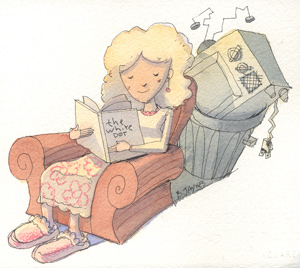|
||
      |
Peer Review ::
From our pages
 1911 The Magazine noted
in the fall that Sophonisba P. Breckinridge, PhD’01, JD’04,
then a professor in Chicago’s Department of Household Administration,
had published an article with Edith Abbott, JD’07, in the American
Journal of Society on deplorable housing conditions around South Chicago’s
steel mills. After meeting Jane Addams in 1905, Breckinridge, the first
woman to graduate from the University of Chicago Law School, was inspired
to pursue a career in social work. She devoted herself to dozens of progressive
causes, including compulsory-education laws and minimum wage.
1911 The Magazine noted
in the fall that Sophonisba P. Breckinridge, PhD’01, JD’04,
then a professor in Chicago’s Department of Household Administration,
had published an article with Edith Abbott, JD’07, in the American
Journal of Society on deplorable housing conditions around South Chicago’s
steel mills. After meeting Jane Addams in 1905, Breckinridge, the first
woman to graduate from the University of Chicago Law School, was inspired
to pursue a career in social work. She devoted herself to dozens of progressive
causes, including compulsory-education laws and minimum wage.
1956 In an article reprinted from 1941, Milton Mayer, X‘32, described University founder and first president William Rainey Harper as a precocious genius who lived at high speed. Harper learned to read at three, graduated from Ohio’s Muskingum College at 13, and earned his PhD from Yale by 19. As a college principal and later a professor of Hebrew, Harper bewildered his colleagues with his “titanic power for toil.” When a friend asked Harper if he ever stopped working, he replied, “Why, I’ve got to work—I consider my time worth a dollar an hour,” a wage many times more than what professors earned in 1877.
1981 By the fall of 1981, the University had completed negotiations to move what is now the John Crerar Library’s collection from the Illinois Institute of Technology to Hyde Park. The collection’s 27,000 rare books were an especially valuable addition to campus. Along with texts by Galileo, Einstein, and da Vinci, a copy of Audubon’s classic Birds of America went to the Department of Special Collections at the Regenstein Library. As for the rest of the Crerar volumes, totaling more than 600,000, the University began plans to build the John Crerar Library, which opened in 1984.
1996 The October issue profiled Jean Lotus, AB’88,
editor of The White Dot, a quarterly zine that derived its name
from the way an older television screen fades out as it turns off. Lotus
launched the zine in hopes of connecting people raising children in TV-free
homes. The first issue’s articles, many written by U of C friends,
gave advice on how to follow sports without a TV, how to quit cable, and
how to tell when you’re spending too much time parked in front of
the tube. Since developing the zine, Lotus has also created White Dot,
the International Campaign Against Television, and written a book on the
subject with David Burke titled Get a Life!